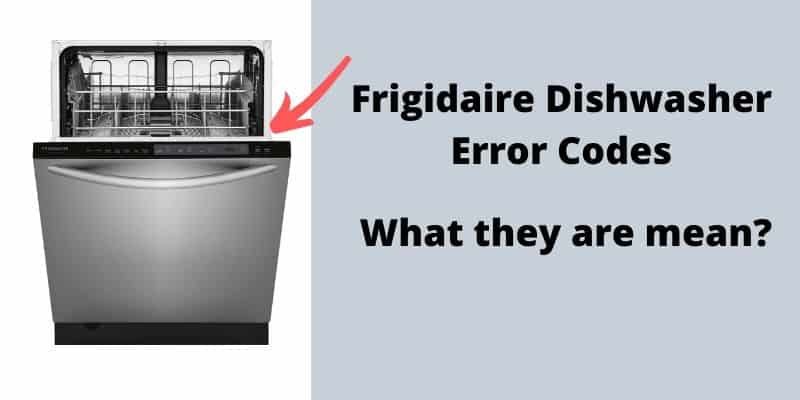
Imagine error codes as your dishwasher’s way of waving a small red flag. Like when your phone pings with a low battery alert, a dishwasher error code is a sign that something’s not quite right. The E3 code on a Frigidaire dishwasher generally indicates a heating issue. It means that the water inside the dishwasher isn’t heating up properly, or maybe not at all. This can be a bit of a problem because hot water is crucial for effectively cleaning and sanitizing your dishes.
Understanding the Error Code E3
When it comes to deciphering what this E3 error means, think of it as your dishwasher telling you it’s feeling a bit under the weather. It’s like when you have a runny nose or a scratchy throat — signs that something’s off. The E3 code specifically hints at a malfunction in the heating element or a related component. Here’s how it works: dishwashers rely on hot water to help break down food residue and grease. If the water isn’t heated properly, your dishes might not come out as sparkling clean as they should.
This error could arise from a number of issues, such as a broken heating element, a faulty thermostat, or even a wiring problem. Think of the heating element as the heart of the system, warming the water like a space heater warms a room. If it’s malfunctioning, your dishwasher isn’t operating at full capacity. You might be thinking, “Can’t I just wash dishes without hot water?” While technically possible, you’d likely end up with less-than-clean plates and maybe even some lingering bacteria — not ideal, right?
Moreover, it’s important to remember that ignoring these kinds of issues can lead to bigger problems down the line. If the dishwasher continues to run without addressing the error, there could be a risk of further damage to the appliance. So, if you see the E3 code, it’s a call to action to get to the root of the problem.
Common Causes of the E3 Error
Let’s dive a bit deeper into what might cause this E3 error code. Imagine your dishwasher as a mini assembly line with each part playing a critical role. One of the usual suspects here is the heating element, which, as mentioned before, is responsible for heating the water to the right temperature. If this element burns out, it’s like trying to make tea with cold water — just not effective.
Another possible cause is a broken thermostat. Think of a thermostat as the control tower of your dishwasher, ensuring the water temperature is just right. If it’s on the fritz, then the water might not get hot enough to clean your dishes properly. And then there’s the possibility of faulty wiring. If the wires connecting the heating element or thermostat are damaged, it’s like having a broken link in a chain — the message doesn’t get through, and the water stays cold.
What should you do if you suspect one of these issues? The best step is to consult the user manual or reach out to a professional technician. They can help diagnose and fix the issue, ensuring your dishwasher returns to its optimal performance.
Is It Safe to Keep Using the Dishwasher?
You might be wondering, “Can I still use my dishwasher with this error?” The short answer is, it’s probably best to avoid using it until the issue is resolved. Like driving a car with a warning light on the dashboard, using a dishwasher that’s not heating properly can lead to less-than-ideal results and potentially more damage.
Continuing to use the dishwasher without addressing the E3 error could lead to more extensive repairs in the future, not to mention the inconvenience of unclean dishes. While the machine itself won’t necessarily pose a direct safety hazard, it’s still wise to err on the side of caution. It’s like treating a cold before it turns into the flu — it’s better to fix the problem sooner rather than later.
If you’re keen on fixing the issue yourself and feel comfortable doing so, you could check the heating element and connections, but remember that dealing with electrical components can be risky if you’re not sure what you’re doing. Recruiting a professional is often the safest bet.
Preventative Measures and Next Steps
So, what can you do to prevent the E3 code from popping up in the future? Regular maintenance is key. Just like regular oil changes for your car keep it running smoothly, routine checks and cleaning of your dishwasher can save you from unexpected glitches. Make it a habit to inspect the heating element and thermostat periodically.
Also, watch for any unusual sounds or performance issues. It’s like listening to your car — if something sounds off, it’s worth checking out. Additionally, ensuring the dishwasher is loaded correctly and not overloaded can help maintain its efficiency.
If you’re ever in doubt, remember that reaching out to a professional is always a good idea. They can offer guidance and help ensure your dishwasher continues to serve you well. By being proactive, you’ll keep your dishwasher running smoothly and your dishes spotlessly clean.
In conclusion, while the E3 error code on your Frigidaire dishwasher might seem daunting at first, it’s usually a sign that something needs attention. By understanding what it means, addressing it promptly, and maintaining your appliance, you can keep your dishwasher working efficiently, ensuring it remains a reliable part of your household.